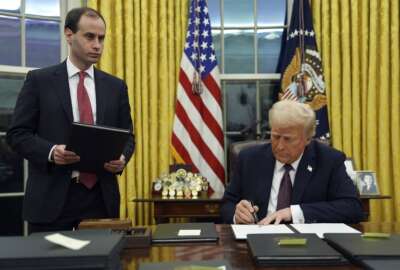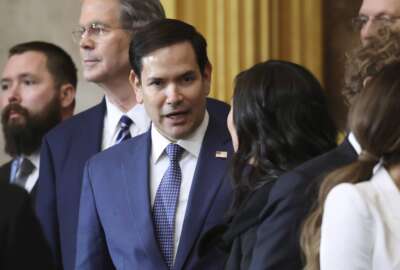White House challenge puts the quest to go green in feds’ hands
The government wants to go green and it's soliciting employee suggestions to help do it. It's a top-to-bottom effort though, as federal agencies also released their...
The White House launched a GreenGov Challenge this week, where it’s asking federal employees to submit their ideas to make agencies more environmentally friendly.
In 2009, shortly after President Barack Obama signed an executive order setting new energy, climate and environmental targets for federal agencies, the administration launched the first GreenGov Challenge, which sought suggestions for new climate and sustainability initiatives. The result was an overwhelming success, as more than 14,000 employees shared 5,000 ideas and cast 165,000 votes for the best ones.
According to its latest press release, however, the administration still wants to do more.
“Federal employees, we want to hear from you,” the release said. “How can we do more to cut emissions and become more efficient both in our facilities and in our daily routine? How can we be more prepared for the impacts of climate change? How can the federal government be a better neighbor in communities across the country?”
Specifically, agencies are looking for ideas to reduce carbon emissions, conserve energy and water, mitigate climate change, reduce waste, promote fleet efficiency and more. Submissions are due by Dec. 5.
Among the implemented suggestions from the first go-round was making federal buildings more bike-friendly.
“In response, a group of agencies collaborated to develop a guide for implementing a successful bicycle commuting program in the D.C. metro area,” said the press release.
The Center for Environmental Quality (CEQ) issued new landscape guides focused on planting more drought-tolerant and native plant species. As per a third suggestion, the administration launched the Capital Solar Challenge, which focuses on installing solar panels on buildings throughout the D.C. area.
The administration also announced it will hold a GreenGov Symposium this year, its first since 2012. Previous symposiums “brought sustainability leaders and newcomers [in all sectors] … together to learn from each other, share ideas and help develop innovative solutions to energy and sustainability challenges in federal operations,” the press release said.
In conjunction with the crowdsourcing plea and symposium announcement, government agencies released their annual revised sustainability plans outlining the steps they’ll be taking in fiscal year 2015 to further reduce their carbon footprints. The plans are part of the Obama administration’s cross-agency priority goals.
“As the largest energy user in the nation, the federal government must also lead by example to reduce its emissions of climate-changing greenhouse gases,” the press release said. “Federal agencies have already reduced their greenhouse gas emissions by 17 percent … and today, more than nine percent of our energy comes from renewable sources. We’ve also cut our potable water use by 19 percent … but … the federal government is the largest energy consumer in the U.S. economy, so we can’t rest here.”
Specifically, the EPA will reduce heating and cooling load at its labs and conserve energy by converting from constant to variable air flow systems that respond to ventilation demand; the FBI will issue sustainable design and construction specifications that require new buildings to exceed current standards by 30 percent where it is cost effective; the Department of Veterans Affairs will complete updates to utility data collection systems to provide estimates of building-level greenhouse gas emissions and help facilities better understand emissions management.
Other climate change considerations include efforts by the General Services Administration to identify and address vulnerabilities in agencies’ data centers, telecommunications equipment and services supply chains; an initiative by the Department of Housing and Urban Development (HUD) to require higher flood elevation for HUD-funded hospitals, housing and other vital community resources; and work by the Centers for Disease Control and Prevention to release case studies from state and city health departments that have conducted climate-vulnerability assessments.
The administration also announced the winners of this year’s GreenGov Presidential Awards, which “celebrate extraordinary achievement” in the pursuit of sustainability. This year’s winners included NASA, the Army, the Department of Transportation, the Navy and the Department of Energy.
RELATED STORIES
Agencies use of renewable energy at all-time high
GSA pushing agencies to reuse, recycle electronics
GSA task force plans for future net-zero energy buildings
Copyright © 2025 Federal News Network. All rights reserved. This website is not intended for users located within the European Economic Area.





